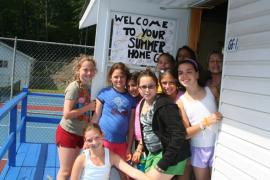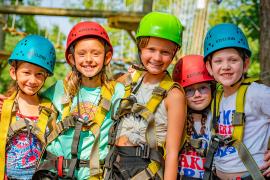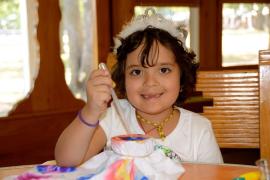I feel like I just spent three weeks at Jewish summer camp. I experienced the highs of color war, the exhilaration of kayaking in the lake, the fear of the high ropes course, and the spirit of singing on Shabbat. Thanks to the occasional letter and the flood of photos that my son’s camp posted online, I got to experience the thrills vicariously. I could write endlessly about the benefits of camp for my child, but, as sociologists like to remind us, the plural of data is not anecdote. Even so, my 10-year-old came back more confident, a greater risk-taker, and happy with his newly found friends. He already wants to sign up for a full summer next year. But none of that was particularly surprising for me.
What was surprising for me — even after having been a camper, camp counselor, and researcher of summer camps — was the intensity of my experience as a camp parent. I believe that understanding the emotions camp parents feel can be instructional for educators, particularly those who work at summer camps.
Educators, especially those responsible for immersive experiences, also need to be reminded that parents handing over their children to another caregiver is unnatural. While I wouldn’t be surprised to learn it, Google could not come up with examples of any other species that willingly hand their offspring over to virtual strangers for any significant length of time. I think this message is one worth reminding camp educators during the summer and throughout the non-camp year. While dropping one’s kids off at camp might seem like a logistical task for camp staff in their late teens and early 20s, it is one embedded with a host of emotions and anxieties they need to understand.
Arriving at camp for a camper like my son is a liminal moment — the step from the known to the unknown, from attachment to agency, from having someone take care of him to largely being responsible for himself. And for me, as a camp parent, it was not surprising that I fell into the trap that so many others have experienced of hitting refresh on my computer screen for 21 days straight just to catch a glimpse of my child swimming, smiling, and surrounded by warm faces. Camp counselors, directors, and staff need to recognize that this was not so much a parent needing to know what my son was doing every second of the day — this was my way of fulfilling a deep desire to know that my son was being taken care of and that he was happy.
Also, as parents, my wife and I want to know as much about our son’s summer camp experience as possible. Trying to get this information out of a 10-year-old is not easy. Of course, we want to know what he ate, that he showered, and how he slept. But we also want to know whether he made new friends, what he did when faced with new challenges, and how he dealt with risk and adversity.
And finally, we sent our son to a Jewish camp, and I want to know what Jewish values he learned, how he celebrated Shabbat, and what his interactions were like with the Israeli counselors. None of this is about prying or being a helicopter parent. All of this is about our wanting to know our son as much as we possibly can to ensure that we can provide him with the very best life possible — not just for three weeks, but all-year round. I think this is a message that camp people need to hear loud and clear. As parents, we love sending our children to summer camp — not because it’s a bubble isolated from their everyday life, but because it should be fully incorporated into every aspect of their life 24/7, 365 days a year.
We all too often claim that we must learn from deficits and mistakes. In this case, however, it’s as a parent who also happens to be an educator, that I’m able to learn from what went so well at my son’s summer camp. May we all continue to understand that this world is too vast and complex for us to be raising our children alone. It’s through valuable relationships and partnerships like the ones between parents and camp staff that we can raise a generation deserving of all we can possibly give them.
David Bryfman is the chief executive officer at The Jewish Education Project and, with his wife Mirm, is the proud parent of Jonah (10) who just spent three weeks at URJ Crane Lake Camp, and Abby (7) who now wants to go there next summer.
The views and opinions expressed by contributors are their own and do not necessarily reflect the views of the American Camp Association or ACA employees.



